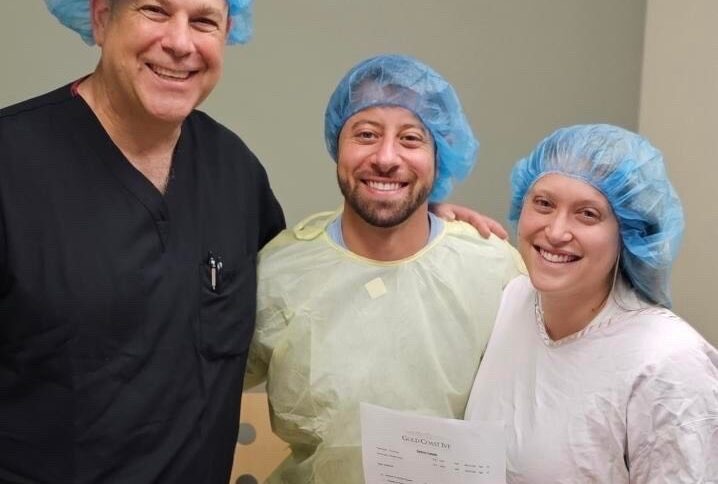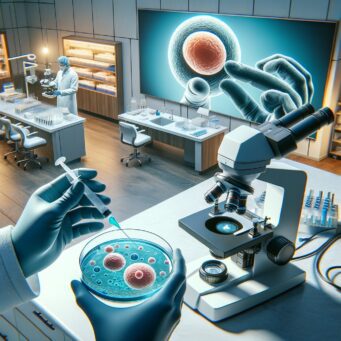
Oh, the holidays! A time of year that can be filled with so much joy, wonder, and abundance for some, while others are left feeling empty, confused, and anxious for the new year ahead. This year is the first that I feel a mix of both and it can be truly paralyzing to be filled with such gratitude and grief at the same time. But for now, I am trying to lean into my gratitude and find the meaning in the madness that has been the last two years of my life.
Today, I am pregnant through the use of donor-egg (DE) in vitro fertilization (IVF). I am 31 and married to my husband for four years. I am young and healthy and did all of the “checkbox” things that society tells you to do by age 30, yet, two years ago, I learned that our path to parenthood would be anything but ordinary.Today, I am pregnant through the use of donor-egg (DE) in vitro fertilization (IVF). I am 31 and married to my husband for four years. I am young and healthy and did all of the “checkbox” things that society tells you to do by age 30, yet, two years ago, I learned that our path to parenthood would be anything but ordinary.
Thanks to Stage 3 endometriosis, undiagnosed for 19 years, my egg reserve is that of a premenopausal woman. After multiple rounds of failed egg retrieval, platelet-rich plasma therapies, all of the supplements, acupuncture, prayers to God, and Hail Marys, it became abundantly clear that my options for motherhood would require us to move a mountain, both physically and emotionally, to have what comes so easily for almost everyone I know.
I remember the mental spiral and devastation I felt when the use of donor eggs was suggested by my fertility doctor. My fear-filled brain thought, “You mean I am going to carry another woman’s baby with my husband’s sperm!?” I cried for days. I contemplated if this meant I wasn’t meant to be a mother. I was filled with rage and envy at everyone who could have a genetic child, so unaware of how lucky they are. Not just to be pregnant, but to be pregnant with their own eggs!
I was filled with rage and envy at everyone who could have a genetic child, so unaware of how lucky they are.
This made me feel like an outsider even in the IVF community, among those who couldn’t conceive without assistance, yet ultimately still ended up with a genetic child. “Congrats! IVF worked for you. Guess what? It doesn’t for everyone,” I would think every time a friend who did IVF, announced they were pregnant.
I channeled much of my emotional turmoil into writing, including a poem about my journey, which includes the following sentiment:
“In order to make a baby,
we just assume the matter,
that eggs and sperm are abundant,
and we all get them on a silver platter.
However this is not the truth for everyone,
no, not even close.
May couples have neither eggs nor sperm,
and sometimes, they lack both!
Without these key ingredients,
what will we do?
How could it be possible,
to ever get to you?”
When you’re backed into a corner,
and your options are slim,
you have no choice but to get creative,
and think of a new way to win.”
Donor eggs are not an intended mother’s first choice. Typically, the decision to use them has come after many failed attempts with her own eggs and the eventual realization and acceptance that she will likely not bear genetic children. That is a very heavy reality to grapple with. We all have examples of how to grieve others who are no longer with us, but, who teaches you how to grieve yourself? These were uncharted waters for me, and they were rocky, to say the least.
This is why I feel both gratitude and grief this year, and that mix of emotions is still very foreign to me. Gratitude that donor egg IVF worked for us, and grief that I had to endure years of trauma to get here.
This is why I feel both gratitude and grief this year, and that mix of emotions is still very foreign to me. Gratitude that donor egg IVF worked for us, and grief that I had to endure years of trauma to get here.
Although the feelings of grief can be all-consuming, I recognize that those feelings do not serve the new purpose that has been put in front of me. I am choosing to lean into the gratitude that I also feel: I am able to carry a child, experience pregnancy, bring a baby into our family, and raise children in a loving home. A home where they will never wonder if they were wanted or how loved they are. And so, although I won’t sugar coat this experience and tell anyone not to feel genetic-loss grief, I will say that with time, emotional work, and support, you can start to feel more grateful than resentful for your unique path.
I am here this holiday season to remind you of what you can be thankful for, as the beautiful, unique, courageous, selfless, and determined donor-egg mother you are, or will be.
Six Truths About A Donor-Egg Conceived Baby
Here are important considerations for anyone considering or carrying a donor-egg baby. These truths are what keep me grounded and this Thanksgiving reminds me why I am so grateful to be pregnant with our miracle donor-egg conceived baby.
1. You Are The Real Mother
You are the real mother – the one growing, birthing, raising, nurturing, and loving your baby. The genetic donor may have provided one unfertilized cell as a precious gift, but it was your intention, alongside your partner, to bring that egg to life. It was your love and desire to become parents that made that baby a reality. There is also substantial evidence that demonstrates how the birth mother influences the activation and deactivation of specific genes while the baby is in the womb. When considering egg donation, think of it as creating a baby who is the result of three individuals rather than just two. Using an egg donor doesn’t diminish your involvement; it simply adds another layer of connection.
2. Your Bond Will Be Stronger Than You Think
I recently spoke with a friend who delivers babies, and she shared her observations about egg donor moms. Contrary to their fears, she noticed that these mothers often form an even stronger bond with their babies. She believes this may be because of the intense struggle they went through to have a child. Once they have their baby in their arms, they realize the true miracle of growing a life in their womb, a miracle that likely wouldn’t have been possible without the intervention of science and the generosity of the donor. The experience becomes a profound journey filled with love, sacrifice, generosity, and strength, unique to mothers who have used egg donation.
3. Genetics Aren’t Everything
Genetics alone will never define the essence of motherhood, parenthood, or family. The strong bond between a parent and child is not solely dependent on genetics. It’s a profound truth that choosing our friends is easier than choosing our family. Sometimes we feel compelled to maintain unhealthy relationships based solely on genetics, when in reality, it’s the emotional connection and healthy attachment that truly matter. Genetics may determine physical appearance, health, and ethnicity, but they do not determine the strength of the relationship between you and your mother, or between you and your siblings. Genetics alone cannot create a strong family bond, a nurturing and loving home, or a healthy attachment style. All of these aspects depend on you as an individual, as the mother you are destined to be, and how you will love, nurture, and raise your child. Whether genetic or not, all mothers have the ability to choose the kind of mother-child relationship they want to cultivate, and genetics play no part in that. Genetics alone will never define the essence of motherhood, parenthood, or family.
4. Learn from Those Who Did Not Have Strong Bonds with Genetic Parents
My father recently told me something profound: “This baby will have your husband’s genetic makeup but will be loved by both of you. They will never know anything different. They will only know you as their true mother. They may have questions, they may explore, they may inquire, but no child raised in a loving home ever wished to be the child of someone else.” My father was raised in a single-mother home, and never had much love, involvement, or attention from his genetic father, even though he lived nearby. My dad has always told me that he would have preferred a non-genetic dad who showed him love and came to his baseball games, over the genetic father who abandoned him.
5. Control What You Can Control
You have one life to live, and there are certain things we cannot change. You have two choices: to live in anger and fear or to reframe your circumstances and accept them. I will be the first to acknowledge that grieving the loss of your own genetics is a real and valid process. Unfortunately, there aren’t many resources or examples on how to grieve for oneself. However, once you allow yourself to grieve, wallow, and contemplate the darkest thoughts, you can start to rebuild, heal, educate, raise awareness, and become the mother you were always meant to be. In fact, you may even become a better mother because of the struggles you’ve overcome. We also can’t control what a child looks like. We cannot guarantee how our child will look, even if we were to use our own eggs. Fantasizing about what a “love child” between us and our spouses could have looked like is just a fantasy because we have no control over how genes express themselves. Our children have our hearts – most important of all.
6. Say It Loud, Say It Proud
Conception versus deception: In my conversations with both donor egg mothers and donor-conceived individuals, a common thread emerged. It’s not the act of conception that could cause confusion and pain later in life; it’s any deception surrounding conception that can be damaging. As long as children know the truth about how they were conceived and you foster pride in their origin, you can help your child avoid the feeling of being deceived or experiencing an identity crisis if they were to discover it later in life. Honesty with them at an early age and normalizing the idea of donor conception within your family, is considered the best approach. For instance, you can explain to your child that they were deeply wanted and loved, and that you went to great lengths to bring them into your lives. There are many wonderful children’s books available to help explain donor conception in a loving and age-appropriate manner. My husband and I started a email account for our future baby, documenting our journey, including the highs and lows, educating them, and sharing everything we have been through. When they are old enough to understand, they can read our words and gain a deeper appreciation for the struggle and determination that brought them into our lives. Honesty with [your kids] at an early age and normalizing the idea of donor conception within your family, is considered the best approach.
When I am scared, frustrated or angry, I remind myself of these truths. I thank God that I am able to carry a child, and experience the profoundness of pregnancy that a few decades ago would not have been possible.
Above all else, this holiday season, I am thankful for advancements in science and the generosity, kindness, and selflessness of those who choose to donate their eggs. To help families who need this to achieve what they were always meant to be—loving parents raising exceptionally loved children.
Contributor
Erica Ferraro
Erica Ferraro, 31, lives in Smithtown, New York, with her husband, Michael, and their golden retriever, Indy. She works in pharmaceutical marketing, is an advocate for donor egg IVF, and manages an online support group for intended DEIVF mothers. On her blog movingmountainsformotherhood she writes about her experience with infertility and mental health. Connect with her @movingmtnsformotherhoodblog.

Listen to stories, share your own, and get feedback from the community.


















